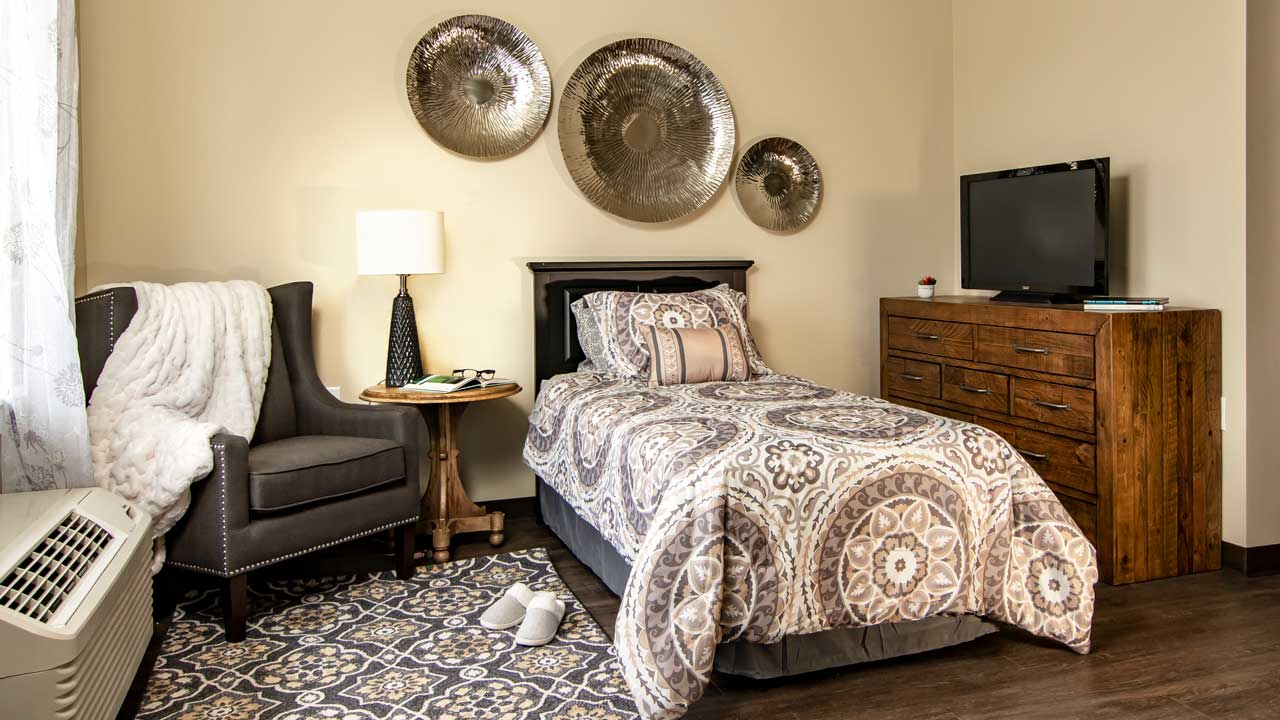All About Memory Care Providers: Why Little Memory Treatment Homes Are a Fantastic Selection
Memory treatment services play an important role in supporting people with Alzheimer's and mental deterioration. Tiny memory care homes stand out for their personalized approach and intimate setup. With lower staff-to-resident proportions, these homes foster more powerful connections and tailored care. Residents take advantage of enhanced social interactions and a safe environment. As families explore alternatives, recognizing the special benefits of tiny memory treatment homes becomes crucial. What factors should be taken into consideration when choosing the appropriate home?
Understanding Memory Care Provider
While numerous may know with general senior care choices, recognizing memory treatment solutions is essential for households facing the difficulties of cognitive decrease. Memory treatment particularly deals with individuals with conditions such as Alzheimer's illness and various other forms of mental deterioration. These solutions give a structured environment that concentrates on boosting the high quality of life for locals via specialized treatment and support.Memory care centers are developed to assure safety and safety and security, frequently featuring safeguarded settings to stop roaming. Educated team member are offered around the clock to aid with everyday activities, drug administration, and personal care. Furthermore, memory care programs often consist of cognitive excitement activities, tailored to involve citizens and promote mental health. Households can take advantage of understanding these solutions, as they allow notified choices regarding their loved ones' treatment, making sure that their certain demands and preferences are addressed in a thoughtful and helpful fashion.
The Benefits of Small Memory Treatment Residences
Small memory care homes offer distinctive advantages that can greatly boost the lifestyle for residents with cognitive disabilities. One considerable benefit is the intimate atmosphere, which enables individualized communications amongst personnel and residents. This smaller sized setup fosters significant connections, decreasing sensations of seclusion and anxiety typically experienced by people with memory issues.Additionally, the reduced staff-to-resident ratio in tiny memory treatment homes makes it possible for caregivers to give even more alert guidance and assistance. This approach not only boosts security however additionally advertises a sense of safety and security for the residents.Moreover, tiny memory treatment homes can adjust promptly to the distinct demands and choices of each citizen, permitting for a much more homelike atmosphere. Such an atmosphere can motivate social interaction and participation in activities, eventually enhancing the day-to-day experiences of those coping with cognitive disabilities.
Personalized Treatment Program for Residents
Individualized care plans are crucial in memory treatment homes, as they cater to the unique demands and preferences of each resident. These plans start with comprehensive analyses performed by skilled experts, who assess cognitive capabilities, clinical background, and personal passions. This customized approach guarantees that care is not just efficient however likewise considerate of each individual's self-respect and autonomy.Moreover, individualized treatment strategies are flexible, allowing adjustments as locals' demands progress in time. This flexibility cultivates a complacency and experience, which is essential for individuals coping with memory difficulties. Caregivers are trained to implement these strategies continually, offering assistance that lines up with the residents' routines and preferences.Ultimately, personalized treatment plans improve the lifestyle for homeowners by promoting freedom, well-being, and interaction, making them a basic element of memory treatment solutions in small memory care homes.
Developing a Home-Like Setting
Producing a home-like environment is essential for cultivating comfort and knowledge in memory treatment setups, as it greatly affects homeowners' emotional wellness. Little memory care homes frequently prioritize tailored touches, such as cozy shade palettes, family images, and familiar furnishings setups, which aid homeowners feel extra secure. Including components similar to a standard home, like relaxing living rooms and communal locations, motivates a feeling of belonging.Moreover, using natural light and outside areas can improve the ambience, advertising leisure and harmony. Staff members play a considerable duty in maintaining this setting by involving with homeowners in a thoughtful way, treating them like household. Regular tasks, such as food preparation or horticulture, can likewise add to a home-like feel, offering possibilities for locals to take part in meaningful experiences. On the whole, producing a supporting atmosphere supports cognitive function and emotional security, making it an essential element of memory treatment solutions.
Improved Social Interaction and Area
Enhanced social communication and area are essential elements of memory treatment solutions. By cultivating customized social engagement and creating a family-like ambience, these solutions advertise meaningful connections among homeowners. Group events and activities further motivate participation, assisting individuals feel extra consisted of and sustained.
Personalized Social Engagement
While social interaction is essential for total wellness, lots of individuals with memory impairments typically battle to involve meaningfully with others. Personalized social engagement in memory care homes addresses this challenge by producing tailored activities that satisfy locals' distinct passions and capabilities. By concentrating on individual choices, caregivers can foster links that reverberate deeply with everyone. Tasks such as art treatment, music sessions, and assisted discussions advertise cognitive stimulation and psychological expression. Furthermore, small team settings urge sociability and enable more intimate communications, enhancing feelings of belonging. This technique not only combats sensations of isolation yet also equips locals to preserve a feeling of identity, ultimately adding to boosted psychological health and top quality of life.
Family-like Ambience
In a memory care setting, fostering a family-like environment considerably enhances social interaction and develops a feeling of community among homeowners. Smaller sized memory care homes commonly prioritize intimate settings, enabling residents to develop closer links with each other and staff members. This nurturing ambience advertises depend on, which is important for people with memory impairments. Citizens are more probable to talk and share experiences, developing a supportive network that alleviates sensations of solitude. The knowledge of shared areas and routines contributes to a feeling of belonging, further encouraging social interaction (personalized memory care). In such setups, emotional bonds prosper, leading to improved overall wellness and a greater top quality of life for residents as they browse their day-to-day experiences with each other
Group Activities and Occasions

Security and Security Functions in Small Houses
Numerous little homes developed for memory treatment integrate essential safety and security and safety functions to ensure the well-being of locals. These homes usually utilize safe and secure entry website here and exit indicate protect against roaming, a common issue among people with memory problems. Furthermore, surveillance systems and alarm mechanisms boost monitoring, ensuring that team can quickly reply to any kind of uncommon activities.Interior formats are customized for safety, with decreased hazards such as clutter-free paths and sharp corners. Handrails and non-slip flooring are typically mounted to lower the danger of drops. Team member are educated in emergency situation protocols, guaranteeing they are gotten ready for various situations.Moreover, personalized care strategies might include analysis of specific safety and security demands, giving tailored remedies for each and every resident. Generally, these safety and safety attributes develop a nurturing setting where homeowners can flourish while preserving their dignity and self-reliance.
Just how to Choose the Right Memory Treatment Home
Just how can family members assure they pick one of the most suitable memory care home for their loved ones? The choice needs cautious factor to consider of numerous variables. Initially, households need to examine the center's staff qualifications and training, making sure that caretakers are experienced in managing memory-related conditions. Next off, it's vital to evaluate the home's setting, concentrating on safety and security attributes and whether it promotes a feeling of neighborhood and belonging. Seeing the facility can supply insight into everyday tasks and the social environment, which are necessary for mental stimulation and psychological health. In addition, families must make inquiries about the care plans supplied, guaranteeing they are tailored to individual demands. Taking into consideration the home's place and accessibility for household gos to can add to a smoother shift. By attending to these facets, households can make an informed choice that prioritizes their enjoyed one's convenience and high quality of life in a memory care setting.
Frequently Asked Questions
What Certifications Should Team Members in Memory Care Homes Have?
Employee in memory care homes need to have relevant certifications, experience in dementia treatment, strong communication abilities, and empathy. Recurring training in behavioral management and healing treatments improves their ability to sustain locals efficiently.
How Do Memory Care Services Differ From Traditional Assisted Living?
Memory care services concentrate particularly on individuals with memory problems, giving customized support and organized settings. In contrast, standard assisted living provides general assistance with day-to-day tasks, lacking the tailored method necessary for those with cognitive obstacles.
What Types of Tasks Are Offered in Memory Care Houses?
Memory treatment homes usually offer a selection of activities created to engage locals. Common alternatives include art treatment, songs sessions, cognitive games, physical exercises, gardening, and get-togethers, all intended at boosting wellness and cognitive feature.
Can Citizens Bring Their Own Items to Memory Treatment Homes?
Residents can usually bring their very own possessions to memory care homes, enabling them to personalize their home - personalized memory care. This practice helps create a familiar atmosphere, advertising comfort and a sense of identification for the people

Exactly How Are Member Of The Family Associated With the Care Refine?
Member of the family play an important duty in the care procedure, frequently joining decision-making, going to treatment conferences, and offering emotional assistance. Their participation fosters a collaborative environment, improving the local's general well-being and lifestyle. While several may be acquainted with general senior treatment alternatives, comprehending memory care solutions is essential for families dealing with the difficulties of cognitive decline. These solutions give a structured environment that focuses on boosting the top quality of life for homeowners with specialized care and support.Memory care centers are designed to ensure safety and click here for more info safety, commonly including secured environments to prevent straying. Customized treatment plans are vital in memory care homes, as they cater to the one-of-a-kind requirements and preferences of each local. Team members in memory treatment homes ought to possess relevant qualifications, experience in mental deterioration care, solid communication abilities, and empathy. Memory treatment services concentrate specifically on people with memory disabilities, providing specialized assistance and organized atmospheres.